January 16, 2007
Criminal because of God or Godly because of Crime?
PJ Manney posted PJ's Big Adventure: The Bible Belt Paradox to the extropians list, starting a vigorous debate. Given the prevalence of religious belief in bible belt states, how come there is so much crime? Shouldn't the godly people refrain from crime and reduce it around them? I don't buy her fun theory that it is the ten commandment's fault, so I did a bit of informal research using the General Social Survey.
Does religious fundamentalism correlate with crime? Comparing the variable FUND ("fundamentalist, moderate or liberal in your religion?") and ARREST ("Were you ever picked up, or charged, by the police?")
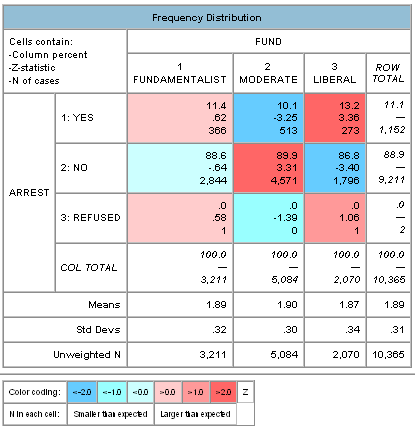
The results shown above demonstrate that there doesn't seem to be a strong linear link. Being moderate appears to increase law-abidingness while liberals seem to be more likely to have been arrested.
See below for a further analysis, leading to the conclusion that people indeed become godly because of crime, not the other way around. Fundamentalism appears to be a defence reaction rather than a cause of crime.
Looking at the TICKET ("Have you ever received a ticket, or been charged by the police for a traffic violation?") shows a stronger pattern: fundamentalists and moderates are less likely than expected at random to get tickets, while liberals get more.
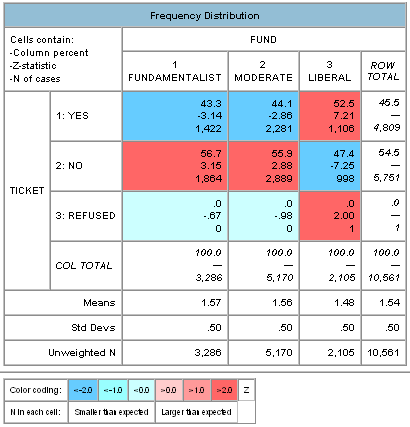
Assuming that the self-reported arrests and tickets are truthful, it doesn't look like fundamentalists are more criminal than others. They are also more likely to think that one should obey the law no matter what, instead of following one's own conscience:
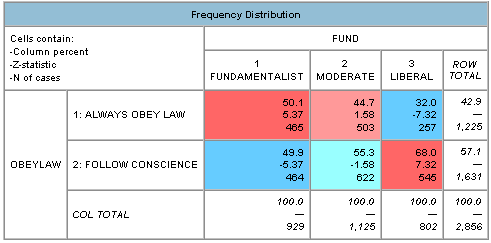
Looking at the CIDEKNEW variable, how many people known to the respondent who were victims of homicide last year a rather chilling pattern emerged. Among fundamentalists far more knew 1-4 victims than would be expected by chance, while moderates and liberals did not have the same pattern.
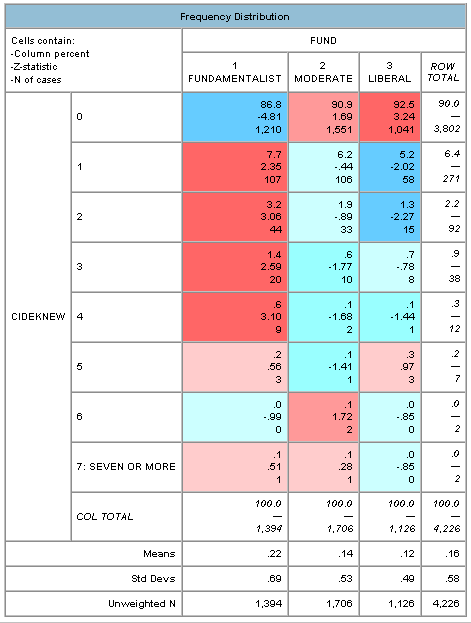
(Incidentally, this seems to suggest that prayer is not very efficacious; presumably fundamentalists pray for the safety of their family and friends more, but they have a higher likeliehood of getting killed. However, this might just be confounded by other factors, see below)
It doesn't seem that likely fundamentalists have selective memories for homicides, so they certainly appear to live in a dangerous environment. This brings up the whole issue of socioeconomic status.
Fundamentalists are overrepresented in lower and working class (self estimated), while religious liberals are overrepresented in middle and upper class (correlation between FUND and CLASS is 0.15).
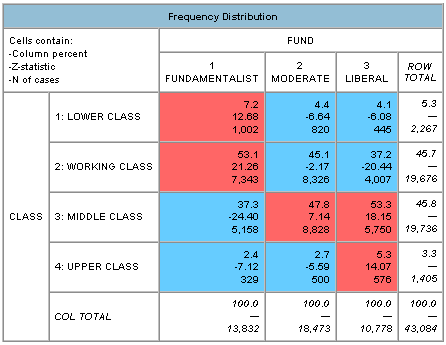
The same is true for self-stated RANK (correlation -0.12).
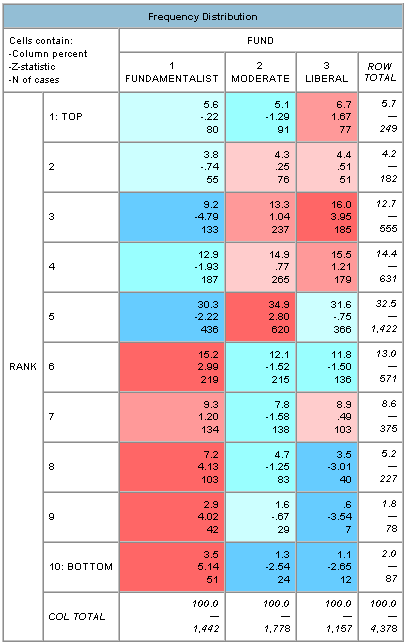
Their income also tends to be lower. So unless fundamentalists are likely to understate their social rank they seem to be worse off in society.
They are also fearful. There seem to be unusually many fundamentalists scoring high on FEAR ("Is there any area right around here where you would be afraid to walk alone at night?"), and fewer feeling safe at home (FEARHOME, "How about at home at night--do you feel safe and secure, or not?").
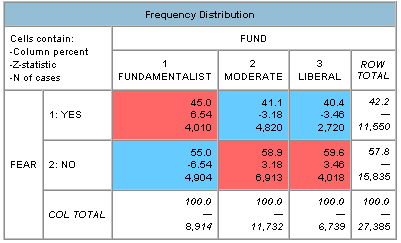
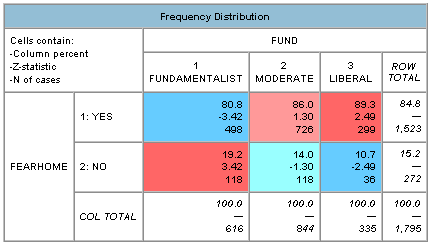
To sum up, fundamentalists do not appear to commit more crimes, but they live in more unsafe lower-class environments and experience more fear in their daily life. They tend to think that one should always obey the law.
To me this doesn't suggest that fundamentalism causes crime, but that crime causes fundamentalism. My picture is that fundamentalism is basically conservatism in the religious field, and given the findings that mortality salience can make people more conservative (see also this popular review and this paper), maybe the cause of the religiousness is simply that these are violent areas (or parts of society)? People with more secure lives do not need the comfort of conservative thinking and cleaving to old values, so they become more liberal.
This also fits in with a study that shows that challenges to fundamentalist beliefs results in increased awareness of death: the faith appears to keep the anxiety at bay. Conservatism and fundamentalism may also be adaptive in bad circumstances if they cause groups to stick together and creates more resilient safety networks (e.g. churches).
Of course, there may be feedback going on here. Areas with higher crime and are less attractive, so they will get less investments and hence tend to remain poor. Fundamentalists are also likely to scare away the creatives, who want areas with tolerance ("the gay index" of success of an urban area). And of course, holding less tolerant views may be a career impairment these days. Poor fundamentalists (in both senses of the word).
I might not be a sociologist, but I play one on the Net.
Posted by Anders3 at January 16, 2007 03:49 PM